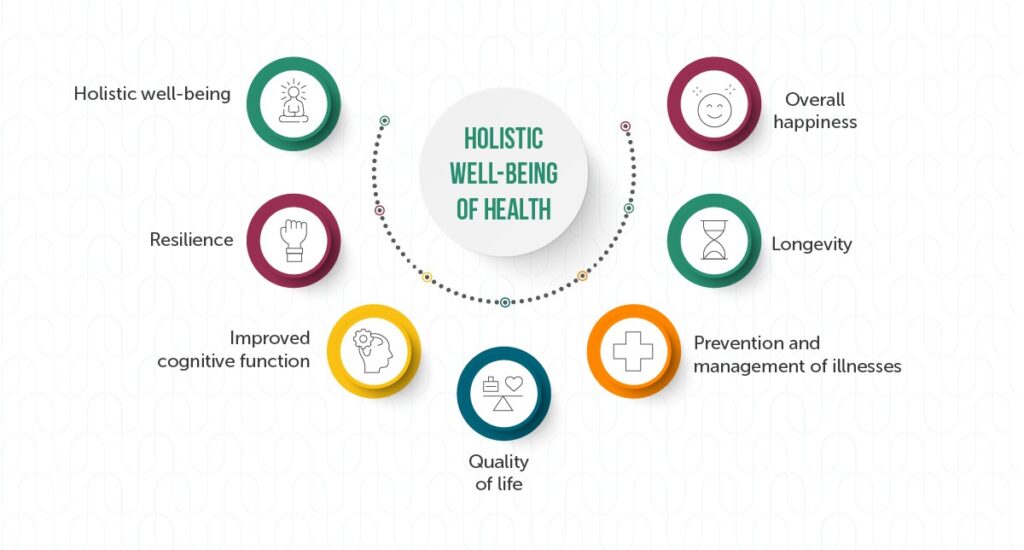In the pursuit of a healthy lifestyle, many people focus solely on one aspect of wellness—whether it’s diet, exercise, or mental health. However, true well-being encompasses a comprehensive approach that integrates physical, mental, and emotional health. Embracing a holistic approach to health means recognizing that each component is interconnected and essential for overall wellness. This blog explores key areas of holistic health and provides practical tips for nurturing every facet of your well-being.
1. Embracing a Balanced Diet
Nutrition is the bedrock of good health. A balanced diet fuels your body, supports optimal functioning, and prevents chronic diseases. It’s not just about eating less; it’s about eating right.
Essential Components of a Balanced Diet
- Macronutrients: Carbohydrates, proteins, and fats are vital for energy, muscle repair, and overall bodily functions. Opt for complex carbs (whole grains), lean proteins (chicken, legumes), and healthy fats (avocados, nuts).
- Micronutrients: Vitamins and minerals such as Vitamin A, C, D, and Calcium play critical roles in immune function, bone health, and cellular repair. Incorporate a variety of fruits, vegetables, nuts, and seeds to cover these needs.
Healthy Eating Tips
- Meal Planning: Plan your meals to include a variety of nutrients and avoid the temptation of unhealthy snacking.
- Mindful Eating: Pay attention to hunger cues and eat slowly to savor your food. This practice can help prevent overeating and promote better digestion.
- Limit Sugars and Processed Foods: Reduce intake of sugary drinks, snacks, and heavily processed foods. Opt for whole, natural foods that provide essential nutrients without added chemicals.
2. The Power of Regular Exercise
Physical activity is a cornerstone of a healthy lifestyle. Regular exercise not only improves cardiovascular health but also enhances mood, boosts energy, and supports weight management.
Types of Exercise
- Cardiovascular: Activities like running, cycling, or swimming improve heart health and endurance. Aim for at least 150 minutes of moderate-intensity cardio per week.
- Strength Training: Lifting weights or using resistance bands builds muscle mass, strengthens bones, and improves metabolism. Include strength training exercises at least twice a week.
- Flexibility and Balance: Yoga and stretching exercises enhance flexibility, balance, and overall mobility. They also help reduce the risk of injuries and improve posture.
Incorporating Exercise into Daily Life
- Find an Activity You Enjoy: Whether it’s dancing, hiking, or team sports, choose activities that you look forward to. This increases the likelihood of maintaining a consistent exercise routine.
- Set Realistic Goals: Start with achievable goals and gradually increase intensity and duration. Celebrate your progress to stay motivated.
- Stay Active Throughout the Day: Incorporate movement into your daily routine, such as taking the stairs, walking during breaks, or engaging in short, brisk walks.
3. Prioritizing Mental Health
Mental health is a critical component of overall well-being. It affects how you think, feel, and act, and influences how you handle stress and relate to others.
Mental Health Strategies
- Practice Mindfulness: Techniques such as meditation, deep breathing, and mindfulness can help manage stress and improve emotional regulation. Even a few minutes a day can make a difference.
- Seek Support: Don’t hesitate to talk to a mental health professional if you’re struggling with anxiety, depression, or other emotional challenges. Therapy and counseling provide valuable tools for coping and healing.
- Engage in Social Connections: Building and maintaining strong relationships provide emotional support and reduce feelings of isolation. Make time for friends and family to foster meaningful connections.
Self-Care Practices
- Journaling: Writing down your thoughts and feelings can help process emotions and gain clarity.
- Relaxation Techniques: Incorporate activities that help you unwind, such as reading, listening to music, or enjoying a hobby.
- Set Boundaries: Learn to manage your workload and personal commitments to prevent burnout and maintain balance.
4. The Importance of Quality Sleep
Sleep is essential for physical repair, cognitive function, and emotional well-being. Without adequate rest, your body and mind struggle to perform optimally.
Sleep Tips for Better Rest
- Establish a Sleep Routine: Go to bed and wake up at the same time every day, even on weekends. This helps regulate your internal clock and improves sleep quality.
- Create a Sleep-Friendly Environment: Keep your bedroom cool, dark, and quiet. Consider using blackout curtains, a white noise machine, or earplugs to enhance sleep conditions.
- Limit Screen Time: Reduce exposure to screens before bedtime as the blue light emitted can interfere with melatonin production and disrupt your sleep cycle.
Address Sleep Disorders
- Identify Sleep Issues: If you experience persistent problems like insomnia or sleep apnea, consult a healthcare provider for diagnosis and treatment options.
- Healthy Sleep Habits: Avoid caffeine, heavy meals, and vigorous exercise close to bedtime to ensure restful sleep.
5. Managing Stress Effectively
Stress is an inevitable part of life, but how you manage it can significantly impact your overall health. Chronic stress can lead to physical and mental health issues, making stress management crucial.
Effective Stress Management Techniques
- Exercise Regularly: Physical activity is a powerful stress reliever. It helps reduce cortisol levels and promotes the release of endorphins.
- Practice Relaxation Techniques: Deep breathing exercises, progressive muscle relaxation, and guided imagery can help calm the mind and body.
- Engage in Hobbies: Dedicate time to activities that you enjoy and find fulfilling. Creative outlets and leisure activities can provide a welcome distraction from stress.
Build a Support System
- Talk It Out: Share your feelings with friends, family, or a support group. Sometimes, simply talking about your stressors can provide relief and perspective.
- Seek Professional Help: If stress becomes overwhelming, consider consulting a mental health professional for additional support and coping strategies.
6. Preventive Health: Proactive Care
Preventive health measures are essential for catching potential health issues early and maintaining overall well-being. Proactive care can help you avoid serious conditions and improve your quality of life.
Preventive Health Practices
- Regular Check-Ups: Schedule annual physical exams and screenings to monitor your health and detect issues early. This includes blood pressure, cholesterol, and cancer screenings as recommended by your healthcare provider.
- Vaccinations: Stay up-to-date with recommended vaccines to protect against various diseases and infections.
- Healthy Lifestyle Choices: Avoid smoking, limit alcohol consumption, and maintain a healthy weight to reduce the risk of chronic diseases such as heart disease and diabetes.
Health Education
- Stay Informed: Educate yourself about health conditions, treatments, and preventive measures. Knowledge empowers you to make informed decisions about your health.
- Practice Safety: Follow safety guidelines in daily activities, such as using seat belts, wearing helmets, and practicing safe food handling.
7. Building Strong Relationships
Strong, supportive relationships are a cornerstone of emotional well-being. Positive social interactions contribute to happiness, reduce stress, and enhance overall health.
Fostering Healthy Relationships
- Communicate Effectively: Honest and open communication is key to building trust and resolving conflicts. Practice active listening and express your thoughts and feelings constructively.
- Invest Time: Make an effort to nurture your relationships by spending quality time with loved ones, engaging in meaningful activities, and showing appreciation.
- Seek Support: Surround yourself with people who uplift and support you. Building a network of positive relationships enhances your emotional resilience and well-being.





